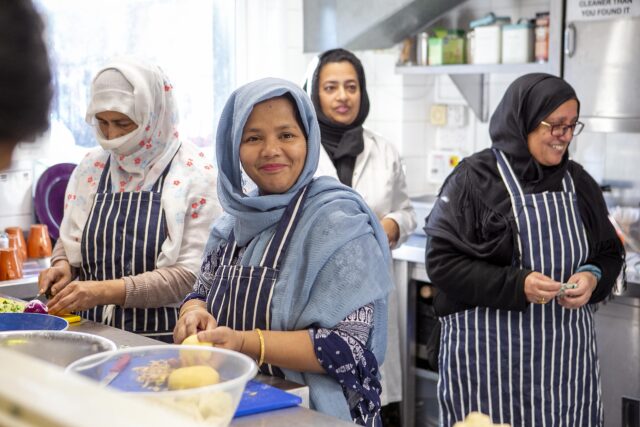Staying social despite the distance

Community spaces lie at the heart of local areas. They provide a place for people to connect, co-operate and develop support networks.
This is why, in 2019, the Co-op Foundation launched ‘Space to Connect’ – a £1.6m partnership with the Department for Digital, Culture, Media and Sport (DCMS) to fund organisations that wanted to improve and protect local spaces and reduce social isolation.
It ran between until 2021 and supported 57 community organisations. Projects ranged from community trusts to youth clubs, arts centres, and city farms. You can read more about Gascoyne & Morningside Youth Clubs in East London, and Liverpool and Merseyside Theatres Trust.
Our partners began work in the autumn but with Covid restrictions entering all our lives just six months later, many had to adapt quickly. Some closed their doors temporarily while face-to-face meetings became a thing of the past. As a flexible funder, we supported our partners as they adapted, created ‘virtual’ community spaces, reached out to vulnerable and isolated people, and co-ordinated support to communities.
Today, we’re sharing the things we’ve learned through an evaluation report developed by Leeds Beckett University (LBU) and Locality. We hope this will help all organisations – not just those we’ve funded – to continue to iterate their output and have most impact as the pandemic changes the ways we all work.
Please share this blog and report with community groups and funders who can learn from how our amazing and dedicated partners. Follow us on Twitter, too, for more updates and information about our funds.
Key points from our report
Learning 1: Flexibility is important
The feedback that came through this report has shown us why our commitment to flexible funding is so important.
Support from funders needs to evolve alongside the changing needs of partners. This will not always be against the background of a pandemic, but the restrictions put in place during lockdown brought this into stark focus.
Groups with new and greater needs will emerge at different points, so it is more important than ever for organisations to listen to people’s needs, aspirations, and issues. There also needs to be more collaboration, partnership, and new approaches to working together.
Learning 2: Language matters
Language and terminology are important when working with community groups. Communities’ spaces enable, empower, and offer a warm and welcoming space where people can support each other. These spaces mean a lot to people, and this needs to be taken into account when speaking about them, and to them.
To refer to these as ‘charities’ is too simplistic and does not capture the picture fully. It also sounds paternalistic when those groups who are benefitting from community spaces are also contributing to them.
Learning 3: ‘Community hubs’ make a difference
The groups involved in Space to Connect created hubs or bubbles of support for groups in neighbourhoods and delivered support and resources via these mechanisms. Alongside public bodies, these organisations served and protected their communities, helping those isolating, providing advice and guidance through co-operation.
Interestingly, we also received feedback that young people and old people want to work together, partially as a result of being bubbled together in lockdown. There provides an excellent opportunity here for intergenerational work, allowing different age groups to work together.
We also found that a blended approach of online and face-to-face contact will be needed in the future to maximise reach, access, and participation – ‘virtual’ spaces have become more important.
Community spaces also became a key way for local authorities and public health teams to engage with communities and provide accurate and relevant information on Covid-19.
We have learnt that local groups can have substantial a role in ensuring specific geographical and ethnic communities receive relevant, targeted information and community organisations have a key role in health promotion. They also supported uptake of the vaccine programme, with some even becoming vaccination centres.
In our partner’s own words
A Space to Connect partner probably explained best how the pandemic has changed how they work: “Since lockdown, we’ve linked in with a lot more vulnerable people and at-risk people than we would have done previously. People who never came near our lunch or exercise [classes] and who probably needed it more than the people who did come … and I think …it’s been a blessing…we have found people who had slipped through the net.”
Next steps
What we have learnt as a result of this evaluation is invaluable as we move into a different phase of the Covid-19 pandemic. It will help to inform our future working and the support we will be offering our partners. We’re looking forward to implementing what we have learnt from a difficult two years for community organisations into our future funding.
Sign up to our newsletter below to find out more about what we’re learning from our funding. Follow us on Twitter to learn more about what we’re doing.
